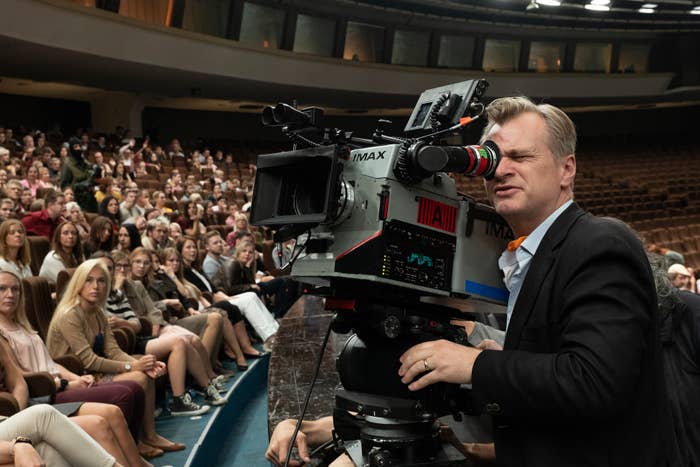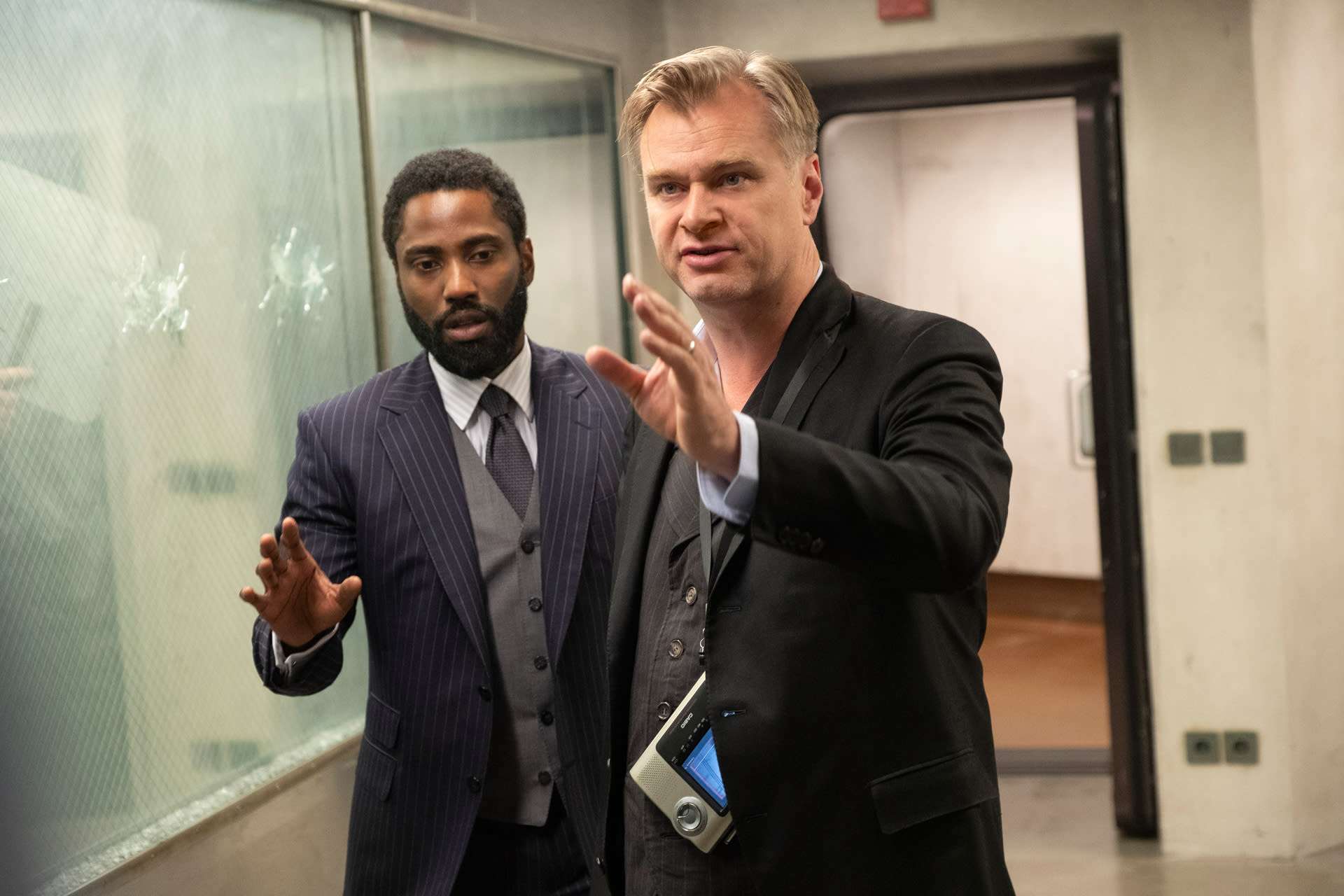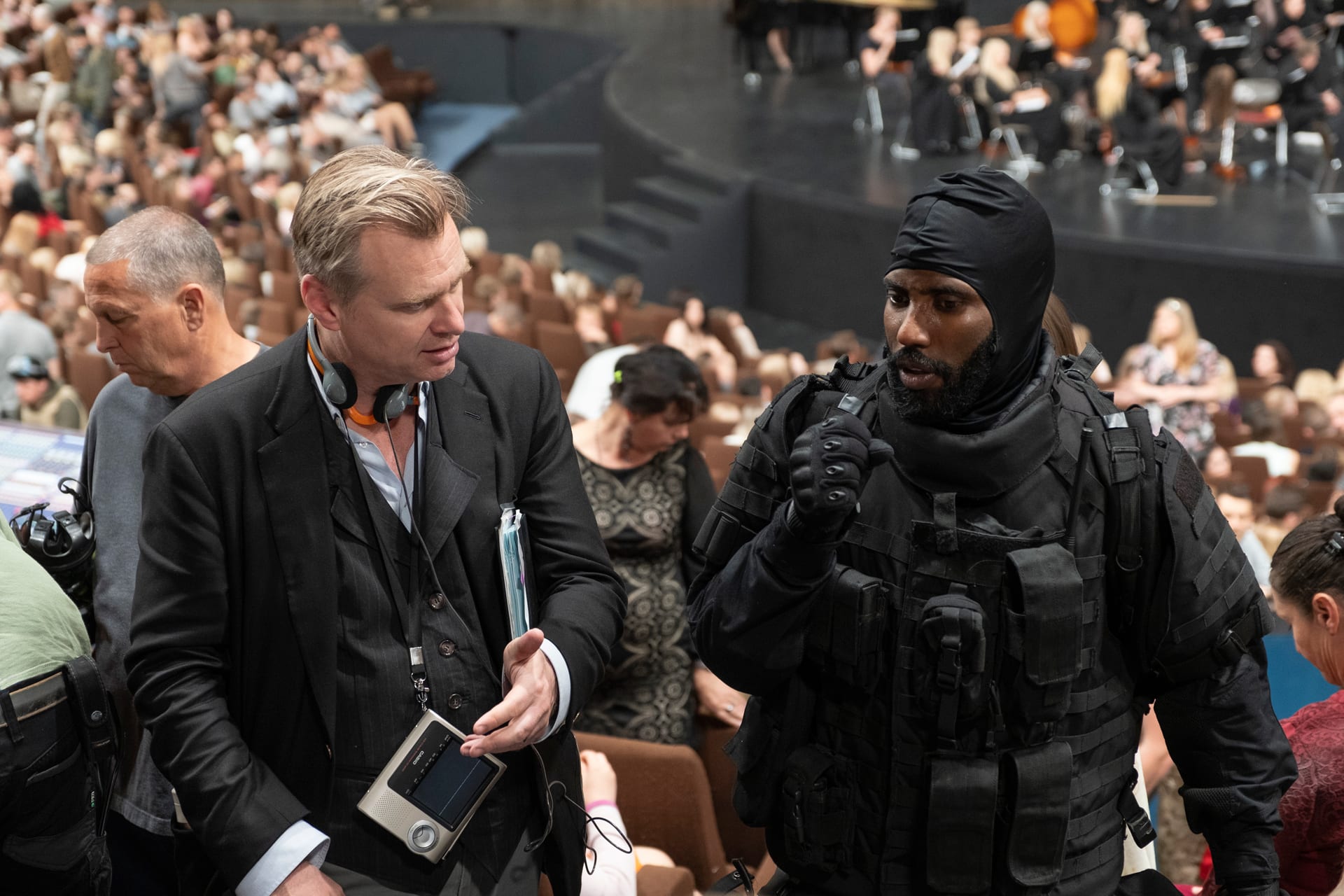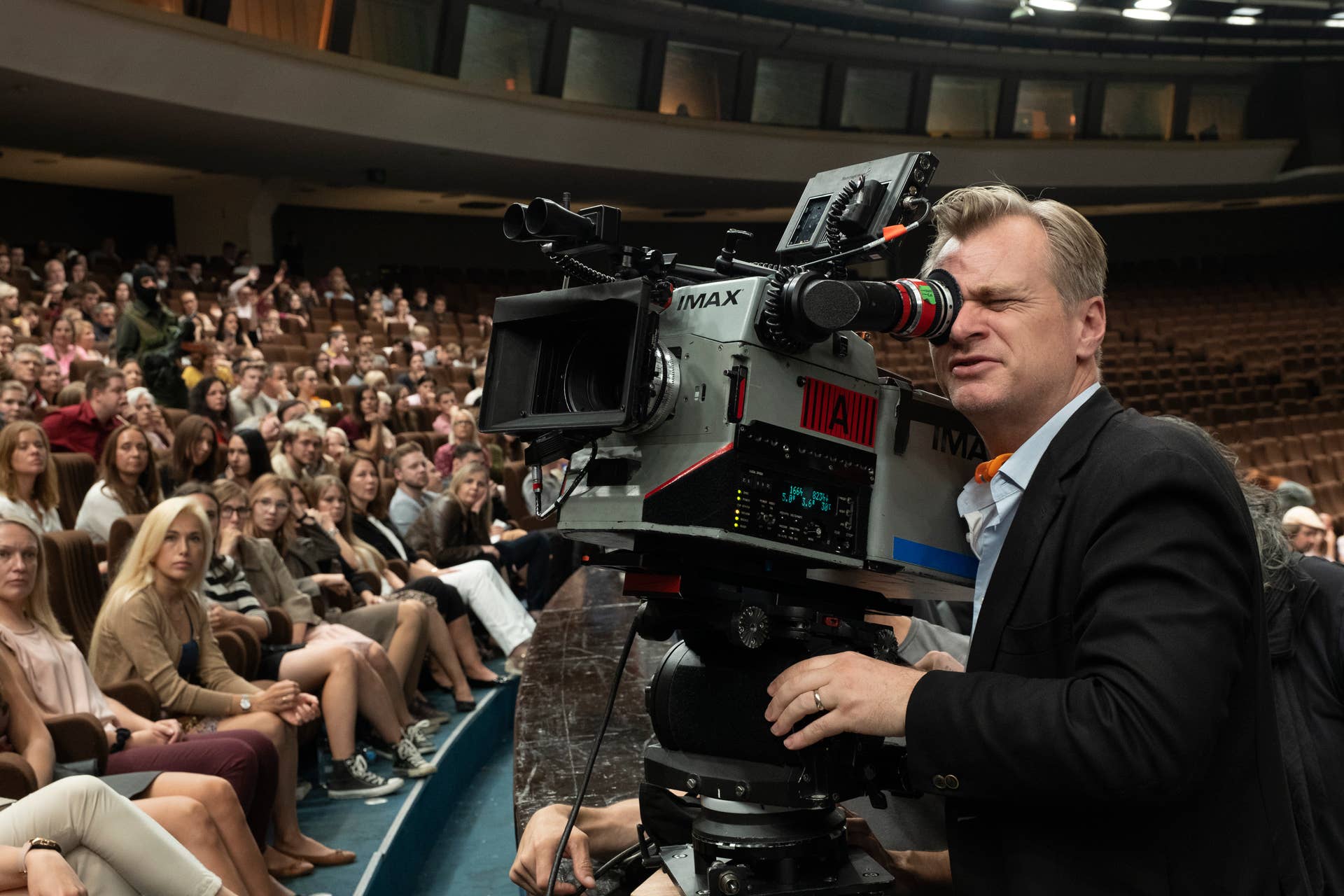
The theater where I saw my first Christopher Nolan film recently shut down. Back in 2001, I was drawn to the cinema specifically because of the commercials for this film about a guy with no short-term memory—Nolan's gem Memento—that intrigued me. While grabbing DVDs to throw on in the comfort of my home was always a given, Memento didn’t feel like a film I could wait to see—I had to experience this film in theaters. My squad assembled, and I was blown away. It wasn't that I'd never thought about non-linear storytelling, nor was this the first indie film I took in. It was just so damn good.
At the time, I was mesmerized by the way the story was presented, but I also picked up on how the film effectively taught you about its non-traditional structure very early on, while also injecting violence, humor, and undeniable style—just check how the color blue bounces off of everything in Memento—that made it stick with me more than I thought I would. Even now, rewatching it after all of this time, I'm amazed that Nolan would go on to take in almost $6 billion as a director of largely original material, most of it with Warner Bros., the production company that he recently went in on over its decision to release its entire 2021 film slate in theaters and on HBO Max. That story actually broke while I was waiting for my opportunity to discuss Nolan's 11th film, Tenet, with him before its home release on Dec. 15.
Tenet's premise isn't too difficult to understand: The Protagonist (played by BlacKkKlansman star John David Washington) is tasked with stopping what could be World War III. To state the catalyst of that would be a huge spoiler, but know that the film involves the concept of time inversion (no, this isn't a time travel story). It involves being able to communicate with the future, and The Protagonist has to both figure out who he's up against as well as understand how things like, say, bullets flying out of walls and back into a gun could even be possible. It's shot beautifully, with strong performances from Washington and Widows star Elizabeth Debicki, and will sit with you through repeat viewings.
Call it corny, but I was struck by how Nolan had been marinating on the idea of Tenet for about as long as I'd been watching him evolve as a director. He chuckles when I bring this fact up to him, and in speaking about what may have caused him to ponder this idea of making a Bond film that deals with the concept of time inversion, Nolan ties a number of points together.
"I've been busy," Nolan says plainly, "but that's part of it. I had this notion of just a bullet getting sucked out of the wall and into the barrel of a gun. It's an image that I had in Memento"—the film literally starts with a bullet flying out of a wall, through a man's skull, and back into a gun—"to demonstrate the structure of that movie, but I always harbored this ambition to make a film where the characters had to deal with the physical reality of that. In a way, an idea comes to the fore when the time is right for it, and it's a hard process to quantify, so I was doing all these other things.
"There are things that you learn how to make," Nolan continues, "and everything in Tenet, interestingly, on the surface of it, they're all versions of action or particular ways of filming things that I've tried before in a different form. You're building on what you've done in the past."
Nolan's done a lot in the past. This is the man who made Inception. He forced a nation to reexamine how superhero stories are told with his Batman trilogy. Without what he's learned from films like The Dark Knight or Dunkirk, would he have even been able to pull off things like some of the fight scenes in Tenet, where the actors had to learn their fight sequences forwards as well as backward? It's entirely possible, but even then, this isn't just about how Nolan's creations helped craft what became Tenet. Part of that is as simple as watching a film, which is how he first caught wind of John David Washington, The Protagonist of Tenet.
"I'd watched [Washington] for a couple of years on the HBO series Ballers and just noticed his charm, his presence," Nolan explains. "You just get struck by somebody. Then I went to the Cannes Film Festival, and I got a call from Spike Lee asking if I wanted to come to the world premiere of BlacKkKlansman. I didn't know what it was. I didn't think about it. I put my tuxedo on and went to this very glamorous premiere. I got sat right in front of Spike, and it was a terrifying experience to sit there and watch a filmmaker's film and he's sitting right behind you, and really not knowing what that film was going to be.”

Nolan was already halfway through writing the script for Tenet and struggled to get Washington out of his head. "You saw him just hold your attention and hold this movie and draw people of all different types—this is the universal language of movies, being drawn into the story and getting this guy and going on the journey with this guy. I just felt like, 'This is a guy who can open this world up to the audience.' There's a warmth and a generosity of spirit to John David that applied to this type of character. I think it's a very unique thing that he's done with The Protagonist."
Nolan set out to make the ultimate spy film, but not fall on the tropes of what we've seen with the Bonds and many other leads in that genre. "These characters, they tend to be cynical and cold, and they almost pride themselves on that," Nolan says. "And yet you're asked to believe that they would sacrifice themselves for their fellow human being. To us, we saw there's a gap there. There's something missing there. What if you could see that empathy? You could feel that empathy as an audience member? Combined with the fact that he looks fantastic and kicks ass in all kinds of amazing ways and is unbelievably athletic, he's just the complete package, and what a star."
It's that star quality that led to one of my favorite small moments in Tenet: right before The Protagonist has to battle a group of thugs in a restaurant kitchen, he utters a line that feels so outside of your normal spy film but also felt right at home with me: "I ordered my hot sauce an hour ago." It was so absurd, and so perfectly delivered, I remember laughing out loud while taking in the film. In a conversation with Washington earlier that day, he admits that he'd come up with the line on his own. "Chris laughed, and I got a laugh out of him," Washington remembers. “There wasn't anything written there, and he basically was like a coach asking a quarterback to make a play."
I mention this exchange to Nolan, and as he grins, reflecting on the "mischievous" moment (his word, not mine), he seems eager to break down how a tiny ad-lib like that could make it into a film so meticulous that they had to have monitors that showcased where in the timeline moments in the film were situated. "When we were rehearsing it, I sort of thought, 'Yeah, there's kind of an opportunity there.' So in front of the whole crew, I said something... I don't remember the words I used, but I'm like, OK. Then, when John David gets there, then he says something really funny that he's going to come up with and we carry on with the scene.' He kind of looked at me like, 'Oh, OK,' walked off, spent a few minutes, came in with that. I just thought it was hysterical. It was fantastic. I said to him, 'I'm sure that's in the movie,' and it is."

That's a small detail in a film that's full of large moments. There are huge 747s, Washington and Robert Pattinson (who, while "reticent about opening that can of worms," did get some words of advice from Nolan about becoming Batman) bungee jumping up buildings, and other insane stunts and explosions—including an end battle that would've felt massive on an IMAX screen. That's something I've not had the privilege of seeing, and when I inquired about the possibility of Tenet getting a re-release in theaters when we get on the other side of this pandemic, Nolan seems hopeful, although he is aware that at that point there will be "a hell of a competition for screens because there are so many movies, so many anticipated movies, that are going to be unleashed in that period." That said, even with the reputation of being a theater-first kind of guy, Nolan's not lost sight of the power of the home release.
"In the meantime, you could take the IMAX negative and transfer it to 4K UHD," Nolan says. "I'm very pleased with the Blu-ray, very pleased with the 4K UHD. If anybody has that equipment, it's a spectacular way to see the movie. That's the thing—I'm a filmmaker of the home-video generation. We got our first VHS player when I was 11 years old, so all of my films have always played more in the home. That's the reality, so I've always put a lot of care and attention into home formats, what type of streaming, what type of data compression we use, how we produce the disc. Always very, very interested because that's the way that so many people get to see it."
You may want to put a soundbar on your wish list, as it will heighten the experience, including moments like the end credits, which features Travis Scott's "The Plan," his song made specifically for a film. For that moment, you'd have one of the most prolific film scorers of the last five years, Ludwig Göransson (who scored Tenet after Nolan's regular composer, Hans Zimmer, was working on 2021's Dune), to thank. "We had taken a piece of Ludwig's music and put it on the end, and we screened the movie literally every week," Nolan says. "We'd watch it together, and right towards the end he said to me a really key thing. He's like, 'The end credits, it should grow out of the movie, but it should be something new. It doesn't feel right to reprise,' which is what you normally do."
When Göransson asked Nolan if he was familiar with Travis Scott, Nolan admitted that he was not. "[Göransson] showed me some of his video work," Nolan remembers, calling what he saw "astounding."
"The guy's an incredible artist. I said to Ludwig, 'Look, those things tend to be very complicated. Who knows?' But Ludwig is from that world. He got in touch with Travis personally, and just brought him." Nolan was actually sitting on the other side of the Zoom connection in "the theater where we showed [Tenet] to Travis. He was one of the first people to see the almost-finished movie, and his reaction was just thrilling. It was so much fun to talk to him about it afterward. We started to talk to him about the music, and he just said, 'I got it. I got it,' and then went away. He and Ludwig went away, and they came back with this amazing track. It's phenomenal, and the energy at the end of the movie when that comes on, it's exactly what... This is the best kind of collaboration. It's exactly what I didn't know I wanted that I wanted."
One thing Nolan is familiar with is large-scale action. Tenet's final action sequence was, surprisingly, "the biggest set that's ever been built for any movie," Nolan says. "The final action set wound up being something on a scale that I hadn't even dared hope for. We had a lot of ideas amongst us with the stunt coordinator and the special effects guy, and anything that wouldn't fit into an earlier scene, he'd say, 'OK, let's save that for the final action [sequence].'"
Before long, Nolan and I say our final goodbyes. I'd not come any closer to fleshing out any deeper meaning behind Tenet (Nolan is notoriously guarded about giving you more than what's on the screen, although Tom Shone's The Nolan Variations scratches the surface of the "what does it all mean" as no one has before), but that's not the point. Washington uses an interesting word to describe Nolan: "regular." At first, I take it to mean that Nolan's not this auteur film god that many of us think he is [Ed. note: He kinda is, though]. I soon come to realize that Nolan is more about you feeling something. His job is to make you feel about his films the way he felt about the films that touched him as he was growing up. His brother, Westworld co-creator Jonathan Nolan, told him 20 years ago to stop telling people what he thought of Memento. "I just love that people find things in the film that they want to explore and argue about and analyze, but it's tricky," the Tenet director admits to me. "I learned in my days working on the Batman property: Batman is a character that is so beloved by people, and they're so protective of that, you realized immediately you couldn't engage with what people were worried about. You had to just go off and make the film; otherwise, it'd be paralyzing. It's too big. There are too many opinions, and everybody's right."
Nolan's "regular" is that he's there to put his nose into the work and churn out the best project he can each time he steps into that director's role. Projects that, like Washington says, are events in themselves, forcing you to hit the cinema instead of waiting for them to drop on Blu-ray just like Memento forced me to take a chance on an amazing indie opus.
Sure, there may be some deeply personal feelings or emotions in these films, but instead of placing himself on a pedestal as one of the best directors right now, Nolan is more about creating experiences that viewers a) have never seen before, but b) mirror the feelings of wonderment he got when taking in his favorite films, whether at the cinema or from the comfort of his home. Tenet is challenging, without a doubt, but be it through a perfect one-liner from Washington, a pretty thorough explanation of the film's core premise early on, or some of the biggest action sequences ever shot with an IMAX camera, Nolan's job is to make the best film he's ever made, every time he makes a film. Fan service was never Nolan's game—that's not how you create timeless art.
"At the end of the day,” Nolan says, “you have to trust that if you put work out there that you really believe in and you've done your best, that people will appreciate the sincerity of the effort, even if they don't agree with the approach, necessarily."
Tenet hits 4K, Blu-ray, DVD, and digital release on Dec. 15, 2020.



